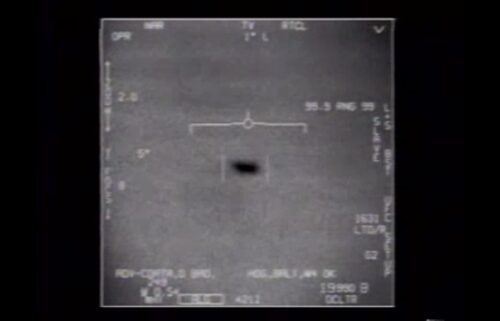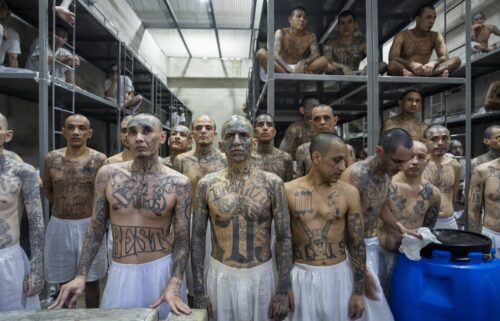How Deanne Criswell blazed a trail from fighting fires to running FEMA
CNN
By Greg Hughes, Dana Bash and Courtney Pence, CNN
(CNN) — Standing in front of a ruined warehouse in tornado-ravaged Marietta, Oklahoma, FEMA Administrator Deanne Criswell was full of questions.
“Have you gotten any sleep yet?” she asked the mayor.
To the sheriff: “Your home is okay? Your family?”
“Do you have any questions for me?” she prompted another official.
It’s a style emblematic of Criswell’s attitude toward disaster relief: On the ground in this small rural community following a devastating EF-4 tornado, her first priority is the people.
After a wave of deadly tornados struck Oklahoma, CNN joined Criswell for an exclusive behind-the-scenes look at how she and her agency approach natural disasters.
Her message to officials is straightforward: “You don’t have to do this alone.”
The reaction from local leaders and survivors alike is uniformly one of gratitude that the country’s top emergency response official came to their town to see the damage and hear their stories firsthand.
But Criswell shrugged off the praise and thanks.
“This is what I do,” she said.
Breaking barriers
Long before she became the administrator of the Federal Emergency Management Agency, Criswell got her start as a firefighter in Aurora, Colorado — just the sixth woman to hold that job.
“I never thought I was going to be a firefighter,” she told CNN in an interview. “That wasn’t on my list of things to do.”
At the time, Criswell was going through a divorce and — juggling college tuition with being a single mother to two sons — decided to join the Colorado Air National Guard to help make ends meet. Given a choice between loading bombs or fighting fires, she chose the latter.
“The firefighters were having a lot of fun and I said, ‘I’ll give that a shot,’” she said with a smile. “I loved it, I was good at it, and I said, ‘I’m going to come back and this is the job that I’m going to do.’”
It’s a job Criswell would do for more than two decades, including two overseas deployments to Kuwait and Qatar after 9/11. Along the way, she graduated from college, earned two master’s degrees, and eventually rose to lead Aurora’s office of emergency management, where she worked to house evacuees and reunify families displaced by Hurricane Katrina.
She joined FEMA during the Obama administration, helping to oversee the agency’s response to natural disasters across the country. In 2019, she became the first woman to lead New York City’s Emergency Management Department, where — less than a year into the job — she helped navigate the city through the darkest days of the coronavirus pandemic.
Now, as FEMA’s top official, Criswell hopes her unorthodox career path will encourage others to seize opportunities and take professional risks.
“You have to be able to allow the journey to help guide you along the way,” she said. “Have the confidence in yourself, take the personal risk if necessary, and just do the work to get to the level that you want to get to.”
A seat at the table
When Criswell was unanimously confirmed as FEMA’s 12th administrator — becoming the first woman to hold that position — shattering a glass ceiling wasn’t at front of mind.
“When I first was asked to come in and do this job, I didn’t really think about it,” she admittted.
That changed in her first week on the job.
“One of my younger female employees had come up to me after a meeting and she said, ‘You know, a year ago, there were zero women in my chain of command between me and the president of the United States,’” Criswell said. “’Now there are five.’ And so what it told me is, people notice, right?”
Criswell knows from experience the obstacles women can face in her line of work.
“As I was coming up in my career, it was always a balance between demonstrating your confidence and your competence with being called the ‘B word,’” she said, acknowledging that term was directed at her “many times” over her career.
“You have to believe in yourself that you deserve a seat at that table, that you deserve your voice to be heard,” she said.
Now that she’s a woman in a major leadership role in the federal government, Criswell uses her position to help elevate the voices of the women beneath her.
“I like to watch how women are either voicing their opinions, or I can maybe sense if they’re afraid to voice their opinions and help encourage them,” she told CNN. “And when somebody says something, I will immediately step in and say, ‘well, that’s a really amazing idea,’ right? In giving that validation at the time, I think it’s important, especially as the leader in the room, to always be observant about the dynamics of what’s happening within that conversation.”
That dynamic is already starting to change — Criswell’s first meeting in Oklahoma, with state emergency management leaders and regional FEMA officials, was led entirely by women.
On-the-ground leadership
In three years as administrator, Criswell has logged more than 100,000 miles of travel, visiting disaster zones in every corner of the United States.
Criswell said seeing the devastation firsthand is critically important to the decisions she makes when determining FEMA’s response.
“It helps me get rid of the red tape,” she said. “It helps me break down bureaucracy in order to ensure that it’s more than numbers — it’s people.”
Criswell emphasizes the importance of taking the time to hear directly from victims. Otherwise, she said, “you can’t feel that emotion, you can’t feel the heartache.”
It also allows her to get face time with officials at every level. In Oklahoma, Criswell made a point of meeting with first responders, local leaders, state emergency management officials, and representatives from affected tribal nations.
Criswell knows that disaster relief transcends party, an approach that has earned her respect and appreciation from across the political spectrum.
“When there’s a disaster and there’s people in need, we’re all Americans,” Oklahoma’s Republican Gov. Kevin Stitt told CNN shortly after appearing with Criswell at a news conference. “And that’s, I think, the administrator’s attitude. These are federal agencies that we have to work with regardless of who’s in the White House.”
Criswell agrees.
“This kind of a partnership, this is absolutely critical to make sure we bring the right people into these communities to help with their specific needs,” she said.
Shaking the governor’s hand, she added, “We will be in touch – you have my number.”
Putting people first
At FEMA headquarters in Washington, DC, the agency’s motto is prominently displayed on the wall: “Helping people before, during, and after disasters.”
It’s a mission statement Criswell has taken to heart. Coming into the job, she said, “I wanted to make sure that we put people first.”
As a former city emergency management director, Criswell knew all-too-well FEMA’s reputation for bureaucratic red tape and convoluted relief programs that made it harder to get help to people who needed it.
“We are an agency that deals with risk every day – that’s the nature of what we do, yet when it comes to our policies, we can sometimes be a little bit more risk averse,” she says. “I wanted to get away from that. I wanted us to really understand what it meant to put people first.”
Her solution was to listen.
“I went to different open disasters and listened to our people, listened to governors, listened to actual people that were impacted about what their barriers were,” Criswell said. “And then we were able to address those by making changes.”
The result was the most sweeping reforms to the FEMA’s disaster assistance programs in two decades.
The changes, which went into effect in March, include:
- Automatically providing disaster victims with $750 to cover immediate expenses and basic household needs.
- Providing people displaced by disasters money up front to give more flexibility when it comes to finding temporary housing.
- Expanding eligibility for FEMA assistance and streamlining the appeals process
- Removing a rule that required survivors to apply for a Small Business Administration loan before they could be considered for FEMA financial assistance; they can now apply for both at the same time.
- Streamlining rules to allow victims to receive up to $42,500 in FEMA assistance to cover costs not reimbursed by insurance companies.
- Allowing FEMA to make repairs to damaged homes regardless of their prior condition and allowing survivors with disabilities to use FEMA funds to make their homes more accessible.
Criswell believes the changes will be transformational and make it easier for FEMA to have an immediate impact on the ground.
“We can actually help people on their road to recovery in a way that makes sense,” she said, “instead of being so restricted by some of the regulations that we have.”
That focus on helping people extends to her staff as well. Recognizing the toll that responding to a seemingly endless stream of natural disasters can have on her team’s mental health, Criswell implemented a “wellness room” just outside FEMA HQ’s nerve center — complete with comfortable chairs and a soothing livestream of birds at a feeder.
“This is a spot where they can come take a timeout,” she said. “We have to be able to invest in our employees and we have to be able to give them, not just the support, but the permission to recognize when they need a break.”
‘Grandma Cookie’
To her staff, she’s “Administrator Criswell.” But to her family, she’s known by a different title.
“I’m affectionately known as ‘Grandma Cookie,’” she admitted
Despite a career filled with demanding jobs, Criswell has never lost sight of her other job: that of a mom to two grown sons and grandmother of three.
It hasn’t come without sacrifices, between multiple deployments and constant travel to different disaster zones. But when Criswell appeared before Congress for her confirmation hearing, her sons were by her side.
“When they were with me that day and you could see how proud they were and how successful they have both become,” she said, “it really just gave me a really warm feeling as a mother.”
The-CNN-Wire
™ & © 2024 Cable News Network, Inc., a Warner Bros. Discovery Company. All rights reserved.


